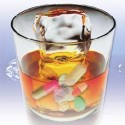Teen drinking Youth alcohol abuse still a major concern
David is a fairly typical teenager in a fairly typical local high school. He can’t wait to get his driver’s license, he eats like a horse and he’s an accomplished athlete. But, unbeknownst to his parents and siblings, David and his friends were having drinking parties — not all the time but, in his words, a few times.
“I got caught the first time and I said I wouldn’t do it again, but I did,” he said matter-of-factly as he sat with his mother at an underage drinking forum sponsored by local community leaders.
April is National Alcohol Awareness Month and the forum David attended is but one of nearly 20 similar forums and town hall meetings being held across New Hampshire and in the Lakes Region.
 The forums, or “town hall” meetings, are supported by a federal grant from the Federal Interagency Coordinating Committee for the Prevention of Underage Drinking and are chaired by the Substance Abuse and Mental Health Services Administration (SAMHSA) in partnership with the N.H. Department of Health and Human Services and the Governor’s Task Force on Alcohol and Drug Abuse.
The forums, or “town hall” meetings, are supported by a federal grant from the Federal Interagency Coordinating Committee for the Prevention of Underage Drinking and are chaired by the Substance Abuse and Mental Health Services Administration (SAMHSA) in partnership with the N.H. Department of Health and Human Services and the Governor’s Task Force on Alcohol and Drug Abuse.
According to New Futures, an advocacy organization working to reduce underage alcohol problems in New Hampshire, nearly one in five youths in this state take their first drink before they are 13 years old.
Alcohol is strongly linked to three of the top five causes of death in 15- to 24-year olds: Unintentional injury, suicide and homicide. New Futures estimates underage alcohol use costs N.H. taxpayers $180 million a year when considering traffic accidents, violence, high-risk sex, alcohol treatment and other alcohol-related factors, including incarceration.
“I’m sitting in my office right now looking at the jail and my guess would be eight of 10 inmates have serious alcohol or drug problems,” said Belknap County Sheriff Craig Wiggin.
Wiggin, a former trooper with the N.H. State Police, said his most vivid reminder of the consequences of underage drinking is a personal one — a classmate of his in Bristol was killed in a drunken-driving accident nearly 30 years ago.
“I see it getting better. There is more awareness,” said Wiggin, who said there are far fewer large drinking or “keg parties” than there were in past years and he believes today’s youth are more aware of the risks associated with alcohol and drug abuse because of school education programs and police efforts like D.A.R.E.
Wiggin also credited what he called two pieces of key legislation with giving law enforcement additional tools that have lowered the underage drinking rate: The “house party” law and the “internal possession” law.
Enacted in 2007, the “internal possession law” not only makes it illegal for minors to possess alcohol but also makes it a violation punishable by a minimum $300 fine for a first offense for those minors who are drunk enough to have more than. 02 percent blood-alcohol concentration, with the proceeds going to the county where the offense occurred.
The “house party” law, or RSA 644:18, was enacted in April of 2004 and makes it a misdemeanor to hold an gathering of five or more nonrelated people where minors have consumed or intend to consume alcohol or drugs.
Increasingly, law enforcement is charging party hosts under this act — including the memorable cases of Susan L. Hanlon, 40, of Gilford who was charged in March of 2006 after hosting a party in her Weirs Road house and John B Paula, 49, of Laconia who was charged in June of 2004 and was the first area person charged under the law.
While both pleaded guilty to lesser charges, the cases generated controversy about whether it was safer to allow minors to drink alcohol under supervision than to have them drink without supervision and chance a possible overdose or drunken driving.
Wiggin doesn’t buy the ‘they’re-going-to-do-it-anyway’ argument nor do most law enforcement officials.
“It’s a wink-and-a-nod that tells youths it’s OK to break the law,” said Wiggin, echoing the same sentiment as Joe Diament, the Chair of the Governor’s Commission on Alcohol and Drug Policy.
“As adults, we disagree with adolescent drinking,” Diament said, explaining that young brains respond adversely to the effects of alcohol — effects that can lead to permanent damage and addiction. “We’re not prohibitionists, we just don’t think young people should drink.”
New Futures State Strategy Project Coordinator Aviva Grasso said these laws are just two examples of a host of efforts to combat underage drinking, including lobbying against a bill that would allow the alcohol content of flavored alcoholic beverages to be increased and sold in New Hampshire and a bill to repeal a clause that prohibits the advertising of happy hours on outward facing signs.
“We also worked against a bill last year that would lower the drinking age,” said Grasso, who said if similar legislation is reintroduced, New Futures would continue to fight it.
Grasso also thinks the education and enforcement efforts are beginning to pay dividends, as does Laconia Police Chief Michael Moyer, whose local statistics show underage liquor law arrests peaked at 161 in 2005 but have tapered since then, with 141 arrests in 2006 and 139 in 2007.
“There’s certainly still a problem and our arrest records show that,” said Moyer who, before becoming chief, served on the N.H Attorney General’s Task Force on Underaged Drinking.
“The days of large keg parties are gone,” Moyer said, adding the instances he sees of parents condoning or hosting drinking parties are not as prevalent as adolescents hosting their own parties when their parents are away and that most of these parties involved 10 or fewer juveniles.
According to David, the high school student who was recently caught drinking, these are exactly the circumstances under which he and his friends were abusing alcohol.
David said the parents of the students were all notified and, depending on the family, punishments were meted out — including his which was a grounding.
“I think it’s fair,” he said shrugging.
About the drinking, he was even less enthusiastic.
“Sometimes it was fun but most times it wasn’t,” he said, saying he wasn’t very energetic the days after he drank and the headaches were awful. “I’d just kind of lay in bed the next day.”
David’s mother believes he has learned his lesson and the experience opened a dialogue between him and her that, although they were already close, caused her to have a great deal of respect for her son.
“I also learned about all the good choices and decisions he made,” she said.
source: The Citizen

